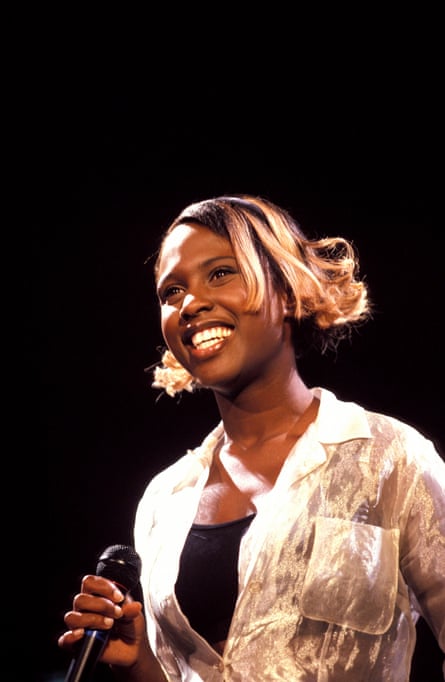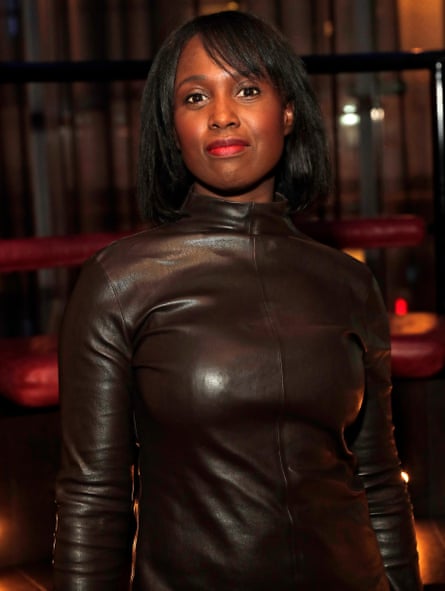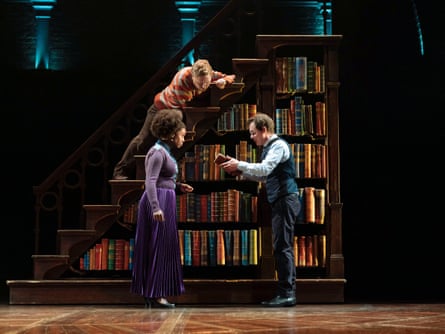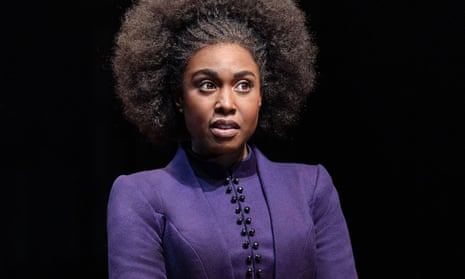Michelle Gayle was 10 months into her role as Hermione Granger in Harry Potter and the Cursed Child last March – and in such full swing that she was in “total denial” of the pandemic – when the West End closed its doors. Sitting in a chintzy backroom of the Palace theatre now, she talks in athletic terms about 12-hour rehearsal days and re-building her stamina. The whole cast is ecstatic to be back, she says, but they are also whispering about how tired they feel.
Exhaustion aside, she speaks of her debt to Noma Dumezweni, whose casting in 2016 sparked online outrage from some at the prospect of a Black Hermione. JK Rowling piled in to the furore to defend the casting and call out the complaints as racist. Dumezweni won an Olivier award for the part. “I owe her a lot of gratitude – I’m standing on her shoulders,” says Gayle. “She got through that [time] with incredible grace and proved she was there on merit because she’s a bloody good actress but she had to take a big hit online to do that. When someone of the quality of Noma steps up, no one’s got anything more to say and then the conversation’s dead. It’s a shame that you have to be brilliant to end that conversation, but there are enough brilliant black actors out there.”
We are living in a new world where diversity is on everyone’s agenda but does Gayle feel the industry has corrected itself significantly since last summer’s black square pledges to do better from theatres and TV production companies? “I think people are starting to be bolder, and I think they realise that true allyship is about being bolder.”

As someone who began life on TV at a tender age – first in Grange Hill as a teenager in 1988 and then EastEnders – she feels that the theatre industry is ahead in the game. “TV is playing catch-up and it needs to play catch-up. I think there’s been reflection, but we’ve yet to see that reflected on screen. I believe that they will be held to account and we will not take the foot off the gas as actors of colour, because we’re discussing things that we shouldn’t even have needed to discuss. The TV companies and production companies that posted black squares last summer will be held to account, 100%.”
Gayle is an actor, Brit-nominated singer, novelist, script-writer, reality TV star and – perhaps most quirkily – was a contender in the Eurovision song contest. Alongside her current West End gig, she is writing an episode of Sky’s A Discovery of Witches and developing a show for a TV channel. I wonder what she considers herself to be first and foremost? “I’ve never looked at myself in that way. I’ve wanted to act, sing, write. I’ve done it from a very young age so for me it would feel strange to choose one and cut another off.”
Still, it takes nerve to leave a prime-time soap opera, as Gayle did when she exited EastEnders, to embark on a singing career. “I knew that I was taking a risk because my record company told me not to do it. They said absolutely don’t leave EastEnders because this might not work out. I never regretted it – it was the right thing to do.”
Her character in the soap, Hattie Tavernier, was part of Albert Square’s first Black British family, a watershed moment for representation in mainstream TV. Looking back, does she think the Taverniers were quite basic in their characterisation – a series of types and maybe even cliches? “Of course it was basic because I grew up in London, in Harlesden, where most people are black, Asian or Irish. But these were ‘firsts’ and there was a lot of fear around how we would be received around the country beyond London, in areas that aren’t so diverse.”
In 2011, she published her first novel, Pride and Premiership, partly inspired by her experience of being married to professional footballer, Mark Bright, for a decade until 2008. The idea came to her at the Edinburgh TV festival, where a psychologist said that 66% of schoolgirls that year had said they wanted to be a Wag. “I was shocked at that. I thought if that’s the case, let me give them an insight.” Does she think that girls are growing up with bigger dreams and passions today or have they simply graduated to the dream of becoming influencers and Love Island contestants? “There’s clearly a massive Kim Kardashian following of getting your hair done, getting your lips done, but I still feel that within that you can still be feminist and strong.”
It’s also just as important to talk about feminism to boys, she adds, speaking of her two sons, aged nine and 21. “I make it very clear to my boys how to treat a woman, what a woman stands for, how they should be viewed. I have discussions with them around feminist issues. My nine-year-old hears something and will say ‘oh that’s so sexist’ to me, which I love.”

What kind of prejudice has she encountered in her career trajectory and has she ever felt boxed in? “A lot of people think if you’re multi-disciplinary, you can’t be serious enough about one thing. Americans don’t have that prejudice so much, so someone like J-Lo can sell perfume, act, sing and be in a film. That’s much more acceptable from a man in Britain – so Kenneth Branagh is allowed to write and act but if you’re female there’s doubt. Someone like Michaela Coel has been able to do it, too – she’s gone from acting to writing, from comedy to drama.”
Gayle’s school recognised her talent for singing and dancing and at around eight she was sent to the Barbara Speake Stage School in Acton, west London, which had a starry young cohort at the time including Naomi Campbell, Amma Asante, and Kwame Kwei-Armah. Was there a lot of competitive jostling and rivalry? It was tough, she says, but her now famous contemporaries were also each other’s biggest allies. “Naomi is my best friend to this day … and Kwame was the one I looked up to. He was older than us and just so talented.”
Her Jamaica-born father, a mechanical engineer, and Grenada-born mother, a social worker, allowed Gayle, the eldest of their five children, to pursue her passions. By the time she was 13, she was paying her own school fees with acting jobs. Her mother was worried all the same. “She was very academic led and she also said ‘Do I see people like you on TV? No. So how is this going to work out?’ So I had to get good exam results – that was a condition of me staying at stage school.”
While Gayle puts her multi-disciplinary trajectory down to many passions, it was also a case of making a virtue out of necessity. While at stage school, she was regularly left alone in the classroom, while her counterparts were asked to audition for shows. (Theatre and TV production companies looking for cast members would, at that time, specify race.) “They would say, ‘All the white girls aged between eight and 10 go down and audition. I was the only black person in my class so I’d be left in the classroom. I knew from a very young age that I’d always have fewer auditions and this lack of opportunity was physicalised – no one needed to tell me. I knew I’d be sitting in the classroom a lot if I only waited for acting jobs.”

How did she cope with the other pressures of stage school at such a young age? “It was hard, and brilliant in equal measure. It’s hard because you do get judged on the stage and your headteacher does tell you ‘That wasn’t good enough.’”
Did it crush some of her classmates? “Yeah, and I realised that because we had a school reunion a few years ago and some people were in therapy because of it. But it made me really tough. If someone says ‘no’, I don’t accept it and that’s been built in me from school. For me, a ‘no’ is just a delay – it’s a ‘not yet’. I truly believe that’s how I’ve been able to sustain earning money in this industry – not because I’m more talented than the other people in my class. It’s my bounce-backability.”
That, she says, along with taking risks and always being led by her passions. “There’s a Jamaican saying ‘Nothing good comes easy’,” she says, as she takes a slug from her water bottle and leaves to begin her 12-hour day.
Harry Potter and the Cursed Child is at the Palace theatre, London from 14 October.

Comments (…)
Sign in or create your Guardian account to join the discussion